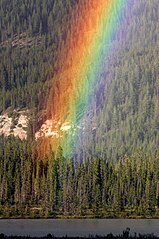A survey done recently in the UK by The Big Bang UK Young Scientists and Engineers Fair found that two-thirds of British parents are stumped when their kids ask them scientific questions. A quarter of them find it embarrassing that they can’t answer them. That’s particularly bad because one third of parents say their kids ask them science questions every day.
The good news is that the kids are clearly curious about science and want answers. The bad news is that most British parents can’t answer them.
So what are the questions British kids are asking their parents that are proving so difficult to answer? Here’s a sample of the most commonly asked, and least commonly answered questions. See how you do.
1. Why is the moon sometimes out in the day?
2. Why is the Sky Blue?
3. Will we ever discover aliens?
4. How much does the earth weigh?
5. How do aeroplanes stay in the air?
6. Why is water wet?
7. How do I do long division?
8. Where to birds / bees go in winter?
9. What makes a rainbow?
10. Why are there different times on earth?
Of course some of them are more difficult than others. Whether we’ll ever discover aliens is up for debate. They’re probably out there but they’re so staggeringly far away that our current understanding of physics suggests we’ll probably not make proper contact with them any day soon. And why they’d want to travel all this way to see us is arguable.
Some of the others, like why the moon is sometimes visible during the day, are fairly simple to answer and I’d be surprised if anyone had much difficulty. However some, although they are perfectly reasonable questions to ask, might challenge a lot of us a bit more. Why IS the sky blue? How DO rainbows form? Why do aeroplanes stay up in the air? With a little luck, and assuming you were paying attention that day, you might remember a few things from your school science lessons. You’ll remember forming rainbows with glass prisms in the science lab, studying the migration of birds and perhaps even a few things from geography.
One thing I found pleasing in the study was that a third of all the parents questioned said that if they didn’t know the answer to one of these questions they do some research and find it out. Particularly in these days of easy internet access it’s not difficult to find the answers for yourself. For instance if you do a Google search for “Why is the sky blue?” you’ll get 81 million hits. Of course some of them will be nonsense but the first ten were all correct and all mentioned how the different colors in white light are scattered by air molecules to different degrees, and how blue light scatters the most. The most scattered light hits our eyes from the most scattered area, leaving the other colors to travel more directly from the sun. Not only is that why the sky is blue, it’s why the sun is yellow.
If you can figure that one out, the rainbow question follows on quite nicely although this time with water droplets refracting the colors within sunlight to different degrees. Incidentally, despite what a rather aggressively religious acquaintance once told me, knowing how a rainbow is formed does NOT make it any less beautiful and impressive. In fact, I think it makes it more wonderful.
What about some bad news? Over 20% of the parents sampled said that if they didn’t know the answer to one of these questions they would either make one up or claim that nobody knew the answer.
One of the suggestions of this study is delightful. Their spokesman, Professor Brian Cox, who you may have seen presenting science programs on DSTV, said:
“the best thing parents can do is work with their children to find the answers – not only can it be fun, but you’ll both learn something new along the way.”I can’t think of anything better than finding out scientific, absolute truth with your children.
Sources
The web site of the The Big Bang UK Young Scientists and Engineers Fair can be seen here. You can download their press release (it's a 193k Microsoft Word document) here.
Some answers to the questions can be seen here at the following links:
 |
| Photo c/o Wing-Chi Poon |
2. Why is the Sky Blue? No, it's not because God is a boy. It's because of differential scattering.
3. Will we ever discover aliens? A Russian astronomer thinks so.
4. How much does the earth weigh? A lot.
5. How do aeroplanes stay in the air? My lesson for today. I thought it was just Bernoulli's principle but it's more complicated than that.
6. Why is water wet? It's not. "Wet" is just a word we use to describe the feeling of water. Call a philosopher.
7. How do I do long division? I honestly don't know, I was sick that day at school. Honest. Answer here.
8. Where to birds / bees go in winter? Bees hibernate, with birds it's more complicated.
9. What makes a rainbow? Water droplets make rainbows.
10. Why are there different times on earth? The Earth is a sphere and it can't all point in the same direction at once.
No comments:
Post a Comment